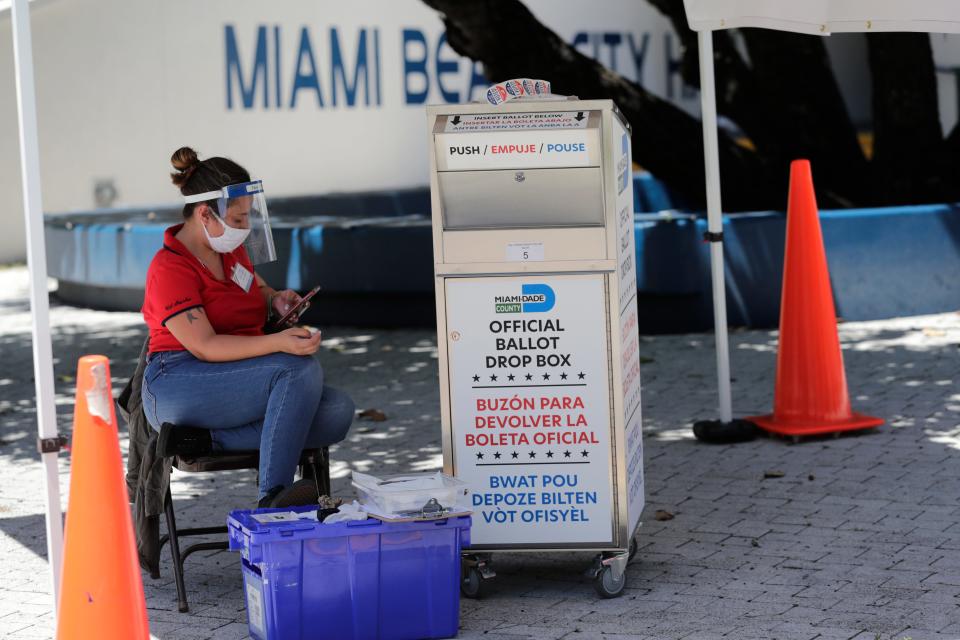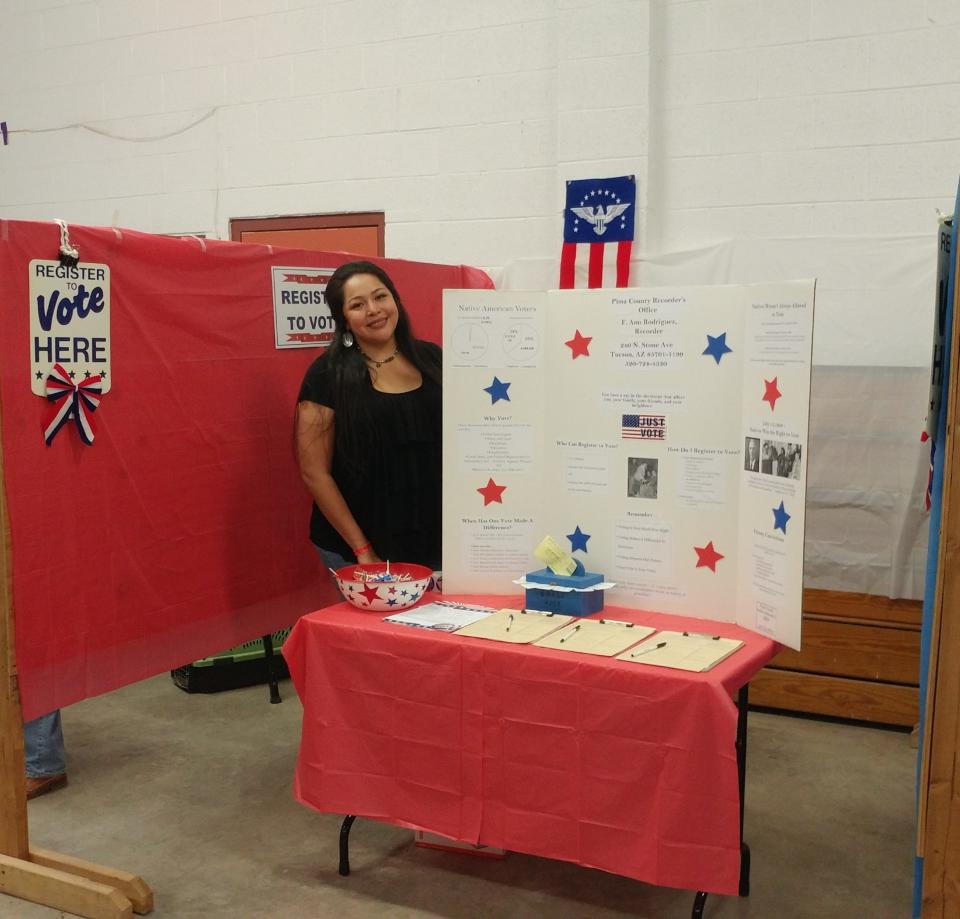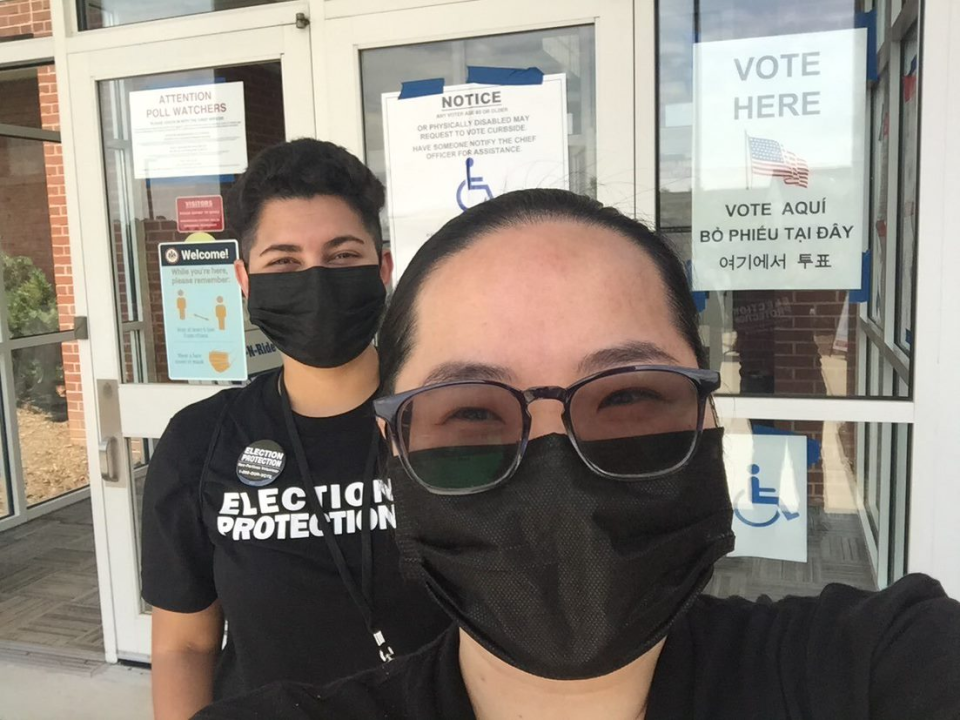Voting rights activists are pushing to speak the language of all voters. It's not always English.
WASHINGTON — Election officials in one Arizona county plan to hold at least three sessions on Indian lands to make sure Native American voters have enough information – some in their native language – to cast their next ballots.
“We're just wanting people to be excited and feel as if they have a voice within our community,’’ said Gabriella Cázares-Kelly, the recorder in Pima County, the second-most populous in the state. “And we can do that by just using their language, using plain language and making them feel like they're a part of it – because they are.’’
As Cázares-Kelly and other election officials prepare for local contests and congressional midterms, some voting rights advocates worry a wave of new restrictive election laws could deteriorate requirements in some communities to provide language assistance to voters. Federal election law requires certain jurisdictions to provide material in languages other than English.
Civic engagement and voting rights groups are ramping up efforts to make sure voters have information in their native language and watching whether election officials comply with the federal law.
ELECTION WORKERS FACED NEW THREATS AFTER 2020 ELECTION: Experts fear it will drive them away

This comes as nearly 70 more jurisdictions are required under the Voting Rights Act of 1965 to provide election information in languages other than English. The number of jurisdictions has increased from 263 in 2016 to the current 331, according to the Census Bureau.
The "lack of pre-election outreach in American Indian and Alaska Native languages, combined with any kind of change in state law or local law or procedure, which you are seeing done throughout the country, is going to have a negative impact on Native voters as well as it will other voters who are limited English proficient,’’ said James Tucker, senior special counsel in the Voting Rights Project at the Lawyers’ Committee for Civil Rights Under Law.
Florida, Texas among states required to provide election material in Spanish
The language assistance provision is part of the Voting Rights Act. The provision, Section 203, requires states and jurisdictions provide language assistance when, among other things, there is a certain percentage of voting-age citizens from a single language minority group who don’t understand English well.
Some languages in covered jurisdictions include Hmong in Ramsey County, Minnesota; Vietnamese in Fairfax County, Virginia; and Navajo in Apache County, Arizona. The Census Bureau published a list of covered jurisdictions in December.
Several states, including California, Florida and Texas, continue to be required to provide statewide election material in Spanish.
'PROTECT OUR DEMOCRACY': Biden puts voting rights at top of agenda, shifting focus as hopes dim for Build Back Better

For the first time, election materials in Vietnamese will be required in Dallas County, Texas, said Terry Ao Minnis, senior director of Census and Voting Programs
at Asian Americans Advancing Justice-AAJC. Texas has the nation's third-largest Asian American population behind California and New York.
In Pima County, election materials are required in Spanish, but Cázares-Kelly said her office will also provide assistance to voters in the Tohono O’odham Nation and Pascua Yaquitribes. Officials plan to put up signage in native languages and hire more bilingual poll workers.
“When we are providing content that speaks to your community, you're more likely to share it with your friends and family,’’ said Cázares-Kelly, who, in 2020, became the first Native American to hold a countywide seat in Pima County.
California, Hawaii propose steps to expand language assistance for voters
Advocates said many of the restrictive laws don’t directly scale back language assistance, but could hurt voters who need the help.
They point to proposed reductions of polling places and ballot boxes on Indian lands where some voters speak Native languages. With fewer polling places and poll workers, voters aren’t likely to have much time or help with language assistance, they said.
“You also see a lot of instances where it's just kind of a collateral effect,’’ said Tucker. “That it may not be the primary reason the law has been adopted, but election officials oftentimes and legislators will know, yes, there is Section 203 coverage here. And if it also happens to have the effect of reducing the availability of language assistance and making it harder for certain voters of limited English proficiency to vote, then we think that's a good thing.”
LAWS AIMED AT VOTER SUPPRESSION ARE 'THE WORST' SINCE JIM CROW: How Black voter trends could be impacted.

Supporters of more restrictive election laws argue they reduce voter fraud and are accessible to eligible voters. The conservative Heritage Action said Thursday it supports a Republican-sponsored bill in Arizona that would check a voter's citizenship.
The bill would, among other things, ban election officials from sending early ballots to people who can't prove their citizenship and are voting in federal-only elections, according to the Arizona Republic of the USA TODAY Network. It would also require proof of citizenship to register to vote for state and local elections.
“These provisions are common-sense, necessary safeguards that will protect Arizona’s election system from fraud and ineligible voters,'' Jessica Anderson, the group's executive director, said in a statement.
Lawmakers in some states have proposed measures that would expand language assistance, according to the National Conference of State Legislatures.
In California, for example, proposed legislation would require bilingual poll workers at certain precincts. In Hawaii, a bill would require the outside of envelopes containing a voter’s ballot to include instructions on how to obtain language translation services in Hawaiian and certain foreign languages.
Advocates said some election laws that were expanded during the pandemic could help lower barriers.
SENATE SAID NO TO VOTING RIGHTS: Here's how civil rights activists are reigniting the fight
Minnis said vote by mail, for example, sometimes appeals to voters with limited English skills. It gives them more time to review ballots and get help from someone they trust to explain it in their language. Bilingual poll workers are also critical, she said.
“Election verbiage can be confusing and so you might need that sort of expertise to help,” said Minnis.
Some election laws aim to limit who can assist voters and how many people they can help, said Thomas A. Saenz, president and general counsel for the Mexican American Legal Defense and Educational Fund, which is challenging a law in Arkansas that limited to six the number of voters a person could help with language assistance.
“It's all designed just to make it harder to be assisted and, therefore, to deter participation by voters who need assistance,’’ he said.
Advocates also worry the political environment around elections could impact how and if jurisdictions comply with language assistance requirements. They point to false claims of massive voter fraud led by former President Donald Trump.
“I am concerned about the reaction in newly covered jurisdictions this year more than I was five years ago or 10 years ago because the context has changed,” said Saenz.
US election officials face challenges: 'The language needs to be precise'
There can be challenges to providing materials in other languages, including producing ballots for the first time and translating material correctly, experts said.
Election officials are supposed to provide language assistance once they receive notice a jurisdiction is covered. Tucker said it can take awhile to fully comply.
“It could be a little overwhelming for those jurisdictions,’’ he said.
Election officials said it’s important to start with outreach to communities.
LIVING ON WATER AND BROTH: Voting rights activists turn to 'political and moral' hunger strikes

In Clark County, Nevada, Lorena Portillo, assistant registrar of voters, said her office reached out to churches and community groups for help translating material and recruiting bilingual poll workers. She also used a translation company for big projects.
“The language needs to be precise,’’ said Portillo, a panelist earlier this month at a virtual summit focused on language assistance hosted by the federal Election Assistance Commission.
Asian Americans Advancing Justice plans to provide grants to local groups to help efforts to provide materials in other languages.
Ahead of some upcoming primaries, Carolina López, national voting rights director for America Votes, said her organization plans to ramp up efforts to check on covered jurisdictions and share best practices.
'WE DESERVE A DEMOCRACY': Voters get fewer choices as Democrats and Republicans dig partisan trenches in redistricting
Her group is part of the Language Justice Committee, a coalition of groups monitoring compliance with Section 203.
“We just want to make sure that every eligible voter has access to the ballot box and I, daresay, in a language that they are comfortable in understanding the content that they are ingesting and voting on,’’ López said.
Some jurisdictions, including Philadelphia, with sizeable communities of colors have provided materials in other languages on their own, Minnis said. She noted that election officials in Fairfax County, Virginia, provided materials in Korean, which is not required under the law.
Cázares-Kelly of Pima County said those efforts make sense.
“Addressing language needs is constantly going to change, constantly going to change with technology, with what people are in your community that need language access,’’ she said. “But what we can do for now is try to provide things as simple as possible.”
Follow Deborah Berry on Twitter: @dberrygannett
This article originally appeared on USA TODAY: Election 2022, and beyond: Activists rally behind Voting Rights Act

